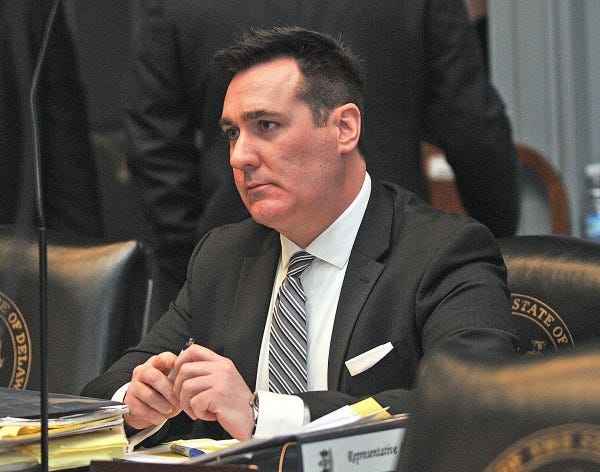Breaking cycle of poverty in criminal justice system: new reforms for fines, fees in Delaware
For D. Marque Hall, not being able to drive was unthinkable.
His license was his livelihood: as a longshoreman, he drove crates onto freight ships in the harbor. It afforded him convenience: he could make check-ins with his parole officer without spending all day on public transit.
It was also his pride. When he was younger, Hall saw his car — an all-black, 1999 Cadillac Eldorado — as a symbol of his value as a person.
But because of unpaid criminal fees, Hall couldn’t legally have a license in Delaware. And if he continued to drive while his license was suspended, he could face even more fines.
It left him with an impossible choice: drive anyways and make a living, or lose his income.
RELATED:Delaware’s probation system is making reentry harder, activists say. Here’s their fix
Hall is not the only person to have been left at a disadvantage after not being able to pay fines off immediately. Thousands of other Delawareans have found themselves trapped in a loop of racking up more fines while losing the tools to pay them off, said Meryem Dede, co-coordinator of the Campaign to End Debtors’ Prison. It has perpetuated the same cycle of poverty that got many people involved in the criminal justice system in the first place.
A new law that went into effect last week sought to change that.
How does the new law work?
House Bill 244, introduced by House Judiciary Chair Rep. Sean Lynn in June 2021 and signed into law in October 2022, reformed multiple laws related to criminal justice fines and fees. Among them were the removal of public defender fees for defendants, the prohibition of imposing criminal fees on children unable to work and, most importantly to activists, the reversal of the rule suspending driver’s licenses for everyone with outstanding fees.
“It was really just putting burden upon burden on people,” Dede said.
CRIMINAL JUSTICE:He was diagnosed with bipolar disorder. Nearly a year later, he died by suicide in prison

Dede has worked with people who haven’t had a driver’s license for decades because of unpaid criminal fees. Others oscillated between having their license and having it suspended depending on whether they could pay off their fees during a certain month.
Unless the crime involved a vehicle, Dede said there’s no reason for the criminal justice system to have any impact on one’s driver’s license.
Most states don’t operate under that thinking though.
Delaware is now one of only 19 states to not suspend driver’s licenses for unpaid criminal fees. D.C. also does not suspend licenses for unpaid fees, and some states allow people to continue driving legally if the unpaid fees are only for traffic violations.
Of neighboring states, New Jersey and Pennsylvania suspend licenses for any overdue fees, and Maryland suspends licenses for unpaid criminal fees.
MORE:How a Delaware farm aims to help parenting, pregnant women recover from addiction
The fight to eliminate penalties for unpaid fees
A suspended driver’s license is not the only consequence for unpaid criminal fees — or the only burden placed on people involved with the criminal justice system even after they’ve served their time.
Similar to how driver’s licenses were until recently, Delaware residents cannot get their criminal records expunged if they have not paid all of their fines and fees. It means that, even if someone has gone years without committing a crime and is otherwise eligible to have their record cleared, unpaid fees will always stand in the way.
“It creates the same cycle of poverty,” Dede said.
It also has the same impact of holding people back from getting jobs or housing.

EXPUNGEMENT:Those minor violations could be hurting you. How expungements can make a difference
Efforts to reform these barriers
Delaware lawmakers have already taken steps to address this. A clean slate law signed in late 2021 will automatically clear the criminal records of Delawareans who meet certain requirements, removing a barrier from expungement.
However, the law will not actually go into effect until 2024.
“We have to continue to work to make sure we have a policy that takes effect and takes effect quickly,” Hall said.
How can you get your license back?
Anyone who has had their license suspended due to unpaid criminal fees and is otherwise eligible to drive can contact the Division of Motor Vehicles to have it reinstated for free. Some people may need to retake a driver’s test or pay a fee if their license has been suspended long enough.
Send story tips or ideas to Hannah Edelman at hedelman@delawareonline.com. For more reporting, follow them on Twitter at @h_edelman.